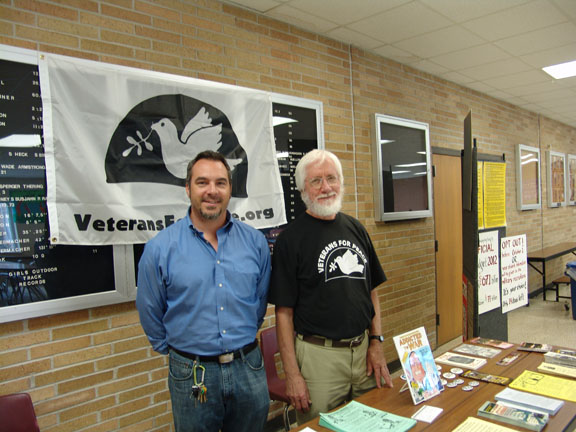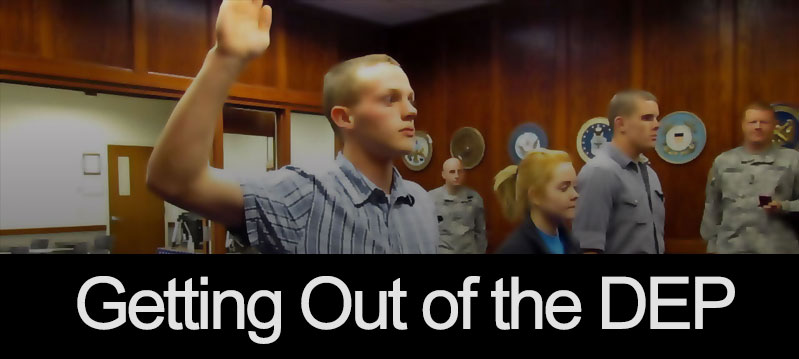https://nnomy.org/depjustdontgo | español
DEP: Just Don't Go
The Delayed Entry Program is also called the Future Soldiers Program in the Army. Individuals going onto active duty, enlist first into the DEP.
Change Your mind and want to get out?
If you signed up for the DEP (or the Army’s “Future Soldiers Training Program”) and then changed your mind, watch out for recruiters who say you can’t get out of it, or that you must report to boot camp to be released. Neither is true. To quit the DEP, there are simple steps you should take before your date to report for basic training. Don’t expect your recruiter to help you, and you should NOT go to a military base if you are told to report there to get released.
For free help getting out of the DEP, first talk to a counselor by contacting the GI Rights Hotline, (877) 447-4487
and leave a message that you want to get out of the Delayed Entry Program with your name and contact phone number and
YOU WILL BE CALLED BACK.
If you need to talk about your situation quickly, call Call the Military Law Task Force @ 619-463-2369 and talk to a counselor ASAP.
FAQ: Here are the Facts on Getting Out of the Delayed Entry Program
- How do you sign up for the DEP
The Delayed Entry Program (sometimes called the Delayed Entry Program) is also called the Future Soldiers Program in the Army. Individuals going onto active duty, enlist first into the DEP. This is an actual enlistment into the inactive reserves, with an agreement to report for active duty (to ship out to boot camp) at a specific time in the future. Under current regulations, one can remain in the DEP for up to 365 days.The recruit still has to qualify medically, academically, legally and pass the security clearance before they’re accepted. Usually a recruit has many months before they have to leave for basic training.
- If you get out of the DEP does this hurt your options for enlisting later
A DEP discharge has one negative effect: If you are discharged from the DEP, and later want to enlist in that same service, you will require a waiver. While waivers are usually granted, you may lose certain benefits, such as the ability to chose what job you want, or what date you will ship out to basic training. This isn’t the case if you decide to enlist in a different branch.
- At what point can you NOT get out. When is it too late
Part of the enlistment process includes going to the MEPS for a physical and swearing in to the DEP and filling out part of the contract (DD form 4). People who have taken these steps can still get out of the DEP using methods described above.Eventually a persons time in the DEP ends and the transition to active duty for training (basic training) begins. On the date when a person is scheduled to report for basic training, they will normally be instructed to return to the MEPS and swear in a second time while they sign the last sheet of the military enlistment contract (blocks 20, 21, and 22 of the DD form 4/3 ) which states that the person wishes to be discharged from the Delayed Entry Program (DEP) and enlisted in the Regular Component.Up until that final point of the second swear in and signing of the last page of the contract, people have been able to get out of the DEP by simply refusing to go. Once a person has sworn in the second time as part of shipping out they may still be able to get out of the military, but it will involve much more time and energy. It is recommended you speak to a counselor at this point.
- What’s the best way to get out of the DEP
You can just not show up the 2nd time. However, others believe the request for discharge from the DEP should be in writing. The letter must clearly state that you are requesting to be discharged from the DEP, and state your reasons why. It is also recommended you send the letter certified and keep a copy so you have proof you sent it. Having the paper trail might be handy if the recruit later wants a career where the discharge might be disclosed (like one involving security clearance, or running for public office). The letter should be sent to the Commander at the recruiting station where the recruit signed up or, even better, the officer over the commander. Do not address the letter to the recruiter.
- What kinds of reasons for requesting separation are acceptable?
As long as the recruit states clearly that he/she is no longer interested, almost any reason is acceptable.The military’s list of discharge categories include: conscientious objection, pursuit of higher education or vocational training, civilian job opportunity, erroneous enlistment or recruiting error, failure to graduate high school, family issues (marriage, children, hardship or dependency), medical or psychological disqualifications, personal problems, failure to report for active duty or “other”.
- What happens if you report to boot camp and then change your mind?
At this point it is probably best to consult a counselor or attorney. You can consult with a counselor at the organizations listed below that are informed on the issues of separation from the military:
Call The GI Rights Hotline @ 1-877-447-4487 or Call the Military Law Task Force @ 619-463-2369
- What if you want to enlist in a different branch
Sometimes people who have signed up for the DEP of one branch of the military decide they want to be in a different branch instead. Because a person is only allowed to be in one branch of the service at a time, a DEP member who wants to change branches must be discharged before he or she can sign another contract. Because many recruiters leave people in the DEP for the entire year allowed, this presents a problem when people are in a hurry to join another branch. One avenue to speed up the process of getting out is to submit a letter asking for release. (Some people use certified mail and save a copy of the letter for themselves.) Telling the recruiter that you are interested in joining a different branch of the military may cause the recruiter to delay your release as long as possible, knowing that you can’t join another branch until you are released.If after 2-3 weeks of asking for discharge in writing there is no satisfactory reply, a person can contact their local congressional office and ask that an inquiry be done into status of their separation request. (See house.gov or senate.gov for contact information.)
- Are you put in the DEP if you join the Reserves or National Guard
Often people who join the Reserves or National Guard are not put in the DEP. These people are eligible to attend paid drills usually in the Recruit Sustainment Program (RSP). Recruiters in these components sometimes try to use this difference to confuse people into thinking it is much harder for them to get out than it is for people in the DEP. Similar to the DEP, members of the reserve are also separated when they do not report to ship out for basic training. This is typically true for members of the National Guard as well, however because National Guard members are also subject to state jurisdiction, they can face penalties at the state level. While most states simply release people who don't report, there are a few states that have punished some people for not reporting to basic or for missing drill.
Resource Links:
- GI Rights Hotline
- Military Law Task Force of the National Lawyers Guild
- Center on Conscience & War DEP Page
- Flyer and sample DEP separation letter (PDF)
- National Network Opposing Militarization of Youth
- The Military's Not Just a Job. . . It's Eight Years of Your Life
- Veterans for Peace Truth in Recruitment Project
#DelayedEntry #FutureSoldier #NotYourSoldier #DEPJustDontGo #NNOMYpeace
Please consider becoming a $10 per month supporter of The National Network Opposing the Militarization of Youth
And our work to demilitarize our schools and youth.
Donate Here
###
Revised 03/02/2021





 President Trump is facing a backlash from comments he made during a summit with Russian President Vladimir Putin Monday in which he appeared to take Putin’s word over the U.S. intelligence community. And on
President Trump is facing a backlash from comments he made during a summit with Russian President Vladimir Putin Monday in which he appeared to take Putin’s word over the U.S. intelligence community. And on  That’s the question Ed Flaherty poses. You’ll have seen Flaherty at the downtown Friday Peace Rally, which has been happening nearly weekly for 14 years, recognizable by his shock of white hair, engaging, gregarious manner, and fierce sense of conviction.
That’s the question Ed Flaherty poses. You’ll have seen Flaherty at the downtown Friday Peace Rally, which has been happening nearly weekly for 14 years, recognizable by his shock of white hair, engaging, gregarious manner, and fierce sense of conviction.




